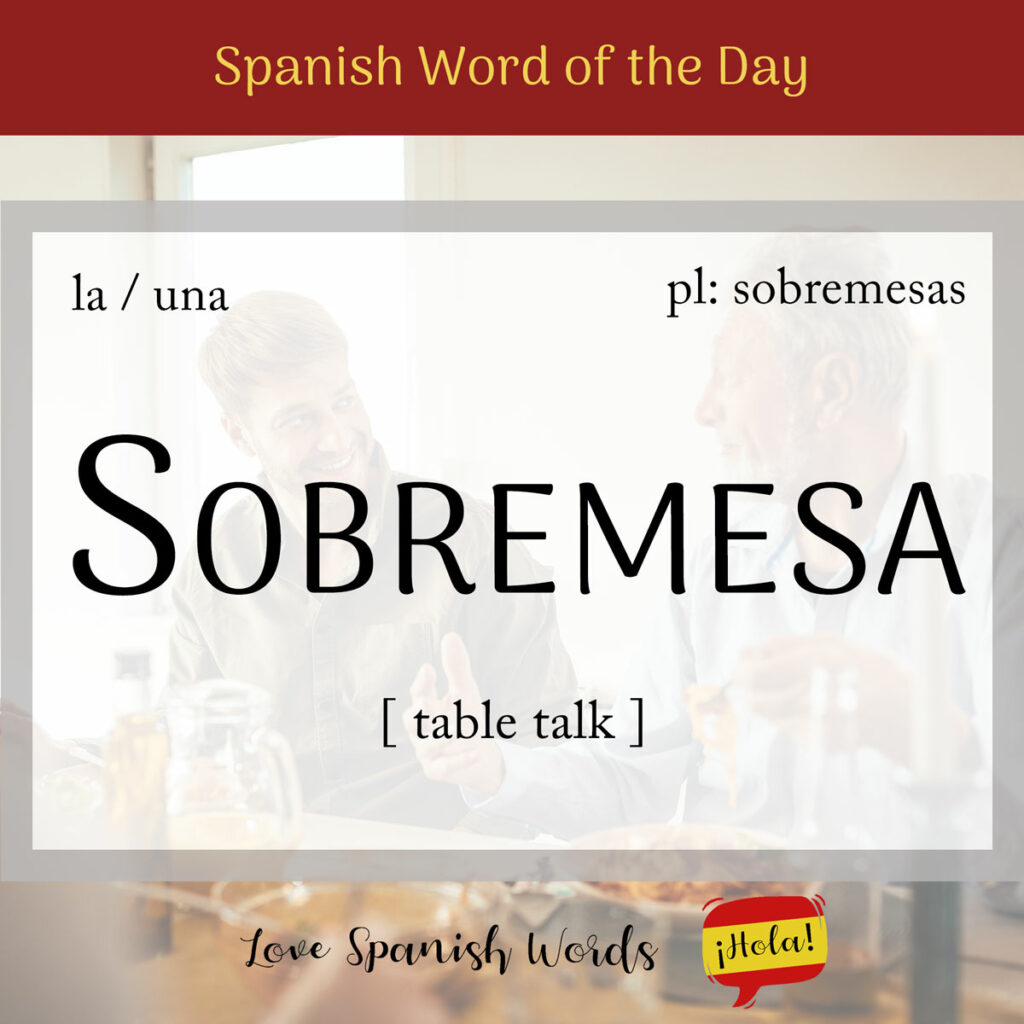I visited my family in Spain earlier this year, and we spent a lot of time at the table eating and talking. Having two or three dishes per meal is the norm there, but the most important part is the conversation you have while eating. Sobremesa is a term with no direct translation in English that encapsulates the leisurely time spent at the table after a meal, engaging in conversation and enjoying each other’s company.
Latin American Pronunciation
European Pronunciation

The word sobremesa comes from two Spanish words: sobre, meaning on or over, and mesa, meaning table. As a feminine noun, it takes the following definite and indefinite articles:
- la sobremesa
- una sobremesa
- las sobremesas
- unas sobremesas
The tradition around sobremesa shows the deep roots in Spanish and Latin American cultures, where meals are not just about comida (food) but also about fostering relationships and sharing life’s moments.
Después de la cena, nos quedamos haciendo sobremesa por más de una hora.
After dinner, we stayed talking at the table for more than an hour.
Sobremesa isn’t just a word, but a reflection of a cultural practice in Spanish-speaking countries, a reminder of the importance of taking a break from the day-to-day routine to talk with our loved ones, engage in meaningful conversations, and enjoy each other’s company. Here are some useful Spanish words related to sobremesa:
- postre = dessert
- café = coffee
- plática = chat or conversation
- charlar = to chat or talk
- brindis = toast (raising a glass in celebration)
- aperitivo = appetizer or aperitif
- digestivo = digestif (a drink taken after a meal to aid digestion)
Tomamos café durante la sobremesa.
We had coffee during the sobremesa.
Sobremesa can be enjoyed after any comida (meal), starting with desayuno (breakfast) to share the list of tasks to be done during the day, at almuerzo (lunch) with amigos (friends) to catch up, or at cena (dinner) to share how the day was with your familia (family).

In Colombia, sobremesa can have a slightly different connotation compared to its use in Spain and other Latin American countries. While it still broadly refers to the time spent at the table after a meal, engaging in conversation, it is also commonly associated with the drink you have during this time. This drink is typically café (coffee), but it can also include other beverages like aguardiente (a traditional alcoholic drink), té (tea), jugo (juice) or even a dessert drink.
Quiero un jugo de guanábana de sobremesa.
I want a soursop juice for sobremesa.

Idiomatic expressions with ‘sobremesa’
Hacer la sobremesa
Literal translation: to do the sobremesa
English meaning: act of staying at the table after a meal to talk
Conversación de sobremesa
Literal translation: sobremesa’s talk
English meaning: the conversation that takes place during the sobremesa
Sobremesa larga
Literal translation: long sobremesa
English meaning: a particularly extended period of time spent at the table after a meal
La sobremesa es sagrada
Literal translation: the sobremesa is sacred
English meaning: the time spent together after a meal must be respected

